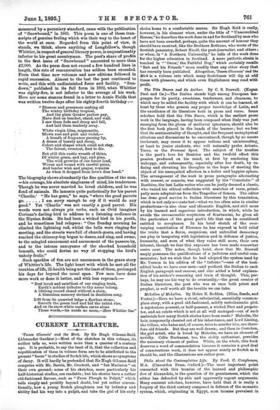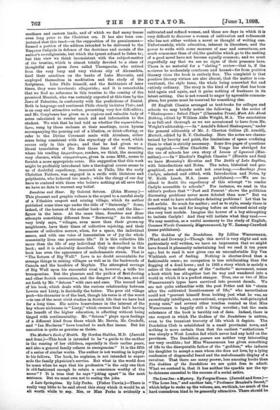Philo about the Contemplative Life. By Fred. C. Conybeare, M.A.
(Clarendon Press, Oxford )—The most important point connected with this treatise of the learned and philosophic Jew of Alexandria, is the question of its genuineness, which the editor has defended by able and apparently cogent arguments. Many eminent scholars, however, have held that it is really a forgery of the third century composed in defence of the monastic system, which, originating in Egypt, soon became prevalent in southern and eastern lands, and of which we find many traces even long prior to the Christian era. It has also been con- jectured that this tract—on the supposition of its genuineness— formed a portion of the address intended to be delivered to the Emperor Caligula in defence of the doctrines and morals of the author's co-religionists, but which the tyrant refused to listen to ; but this view we think inconsistent with the subject-matter of the treatise, which is almost totally devoted to a class of thoughtful and pious Jews called Therapeutte, who retired from the very busy and very vicious city of Alexandria, fixed their ccenobium on the banks of Lake Marccetis, and employed themselves in meditation and the study of the Scriptures. Like Philo himself, and the Rabbinists of later times, they were inveterate allegorists ; and it is remarkable that we find no reference in this treatise to the coming of the promised Messiah, who was certainly expected at this time by the Jews of Palestine, in conformity with the predictions of Daniel. Both in language and sentiment Philo closely imitates Plato, and is an easy and attractive writer, presenting very few difficulties; and Mr. Conybeare has given us a copious and valuable body of notes calculated to render much aid and information to the student. We wish that he had told us whether the rapacrr6vbezot S'auvol, sung by these recluses at their meetings, mean hymns accompanying the pouring out of a libation, or drink-offering, or refer to the Divine Covenant made with Abraham, either sense being consistent with the etymology of the word, which occurs only in this place ; and that he had given us a literal translation of the first three lines of the treatise; where his reading epopssSrepov, renders, we think, the meaning very obscure, while sixpopaisirepos, given in some MSS., seems to furnish a more appropriate sense. His suggestion that this work might be profitably introduced into a theological course seems to us of doubtful expediency, inasmuch as Philo, like the early Christian Fathers, was engaged in a strife with idolators and polytheists, who believed too much ; while the clergy of our day have to contend with those who believe nothing at all save that we have no data to warrant any belief.







































 Previous page
Previous page